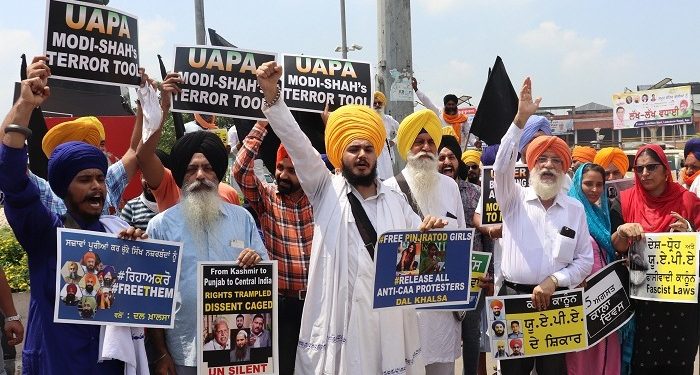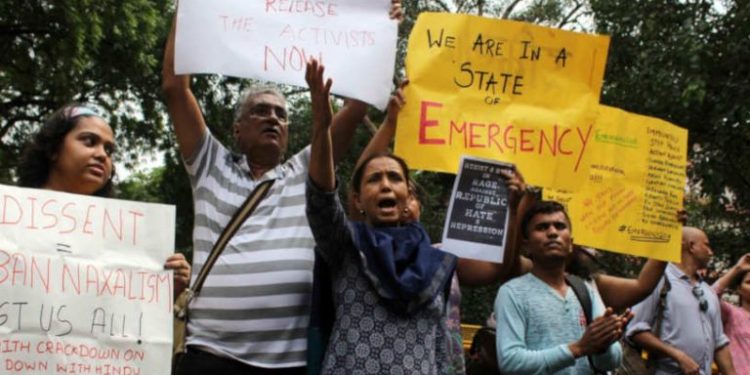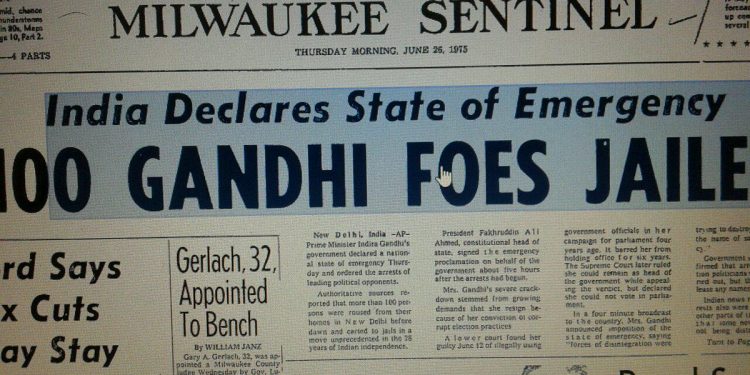The Dangers of UAPA Were Sown in Earlier Preventive Detention Laws in India
Preventive detention laws and anti-terrorism laws, that deviate from regular principles of criminal law, have a history of misuse. In his speech delivered at the KG Kannabiran Lecture 2020, Senior Advocate MIHIR DESAI argues that the time has come to sideline the dreadful UAPA due to the increased and ever more dangerous misuse of anti-terror laws. People are being arrested just for dissenting with the government and denied bail. Excerpts:
Most of the detention laws came not necessarily during the NDA government or BJP government. The preventive laws or anti-terror laws were brought by the constitution, and thereafter by various legislations during the governance of the Congress. They carve out an exception for its lawlessness.
These laws permit the state to say they are governed by the rule of law, but, on the other hand, pass such legislation which violates the rule of law altogether. That’s why it becomes important to look into these laws which give exceptional powers to the state over citizens.
Questions were raised in the Constituent Assembly debates on what to do with preventive detention. The freedom movement had always opposed preventive detention. The freedom movement was about freedom and people cannot be put behind bars unless a charge is made against the convict.
Finally, the assembly agreed, and I think it was wrongly agreed, to have preventive detention as part of the Constitution of India.
Initially, the preventive detention law was there for two years. In the year of 1967, the Congress party lost about six state assemblies and felt that the reason behind the loss was the misuse of the Preventive Detention Act.
Consequently, the Congress-led government brought the Maintenance of Internal Security Act, a preventive detention law. It became a symbol of government lawlessness during the emergency and was repealed after the emergency.
The freedom movement had always opposed preventive detention. The freedom movement was about freedom and people cannot be put behind bars unless a charge is made against the convict.
In 1980, the National Security Act was enacted which allowed preventive detention for up to a year. But unlike the temporary status of preventive detention laws of the 1950s and 60s, NSA acquired a permanent status and became a part of the permanent fiction of law.
How TADA changed normal criminal law
Before 1985, there weren’t any anti-terror laws in India as any act of terrorism was tried for murder or rioting or attempt of murder. But after the violence against Sikhs in 1984, the law of Terrorist and Disruptive Activities (Prevention) Act (TADA) was brought in.
It is important to understand what TADA did, in addition to defining terrorism, as different from the normal laws.

Under the normal laws of criminal procedure, the person has two rights. First is the right to apply for anticipatory bail. A person who is likely to be arrested can apply for anticipatory bail, even if charged with murder, and the court can grant it if it finds that the grounds are not strong enough.
But TADA does away with anticipatory bail.
Ordinarily once a person is arrested the court will look into whether the person will abscond or tamper with evidence and grant bail with some conditions.
But unlike the temporary status of preventive detention laws of the 1950s and 60s, NSA acquired a permanent status and became a part of the permanent fiction of law.
But TADA doesn’t permit bail until the court concludes that the person is not guilty of offences. So at the stage of bail, before evidence is presented or even the trial begins, the court must conclude whether the person was guilty or not. Hardly anyone ever manages to secure bail and the right to bail, under the principle “bail, not jail”, is denied.
Ordinarily, a suspect is in police custody for 15 days upon arrest, which can be extended to one month. The charge-sheet, which gives the grounds for arrest, must normally be filed within sixty days, but under TADA the state can take an extended period of one year to file a charge-sheet. So for one year, you may not know the detailed grounds for which you were arrested. No court will grant you bail without knowing what the bail is being granted for. So effectively it allows preventive detention for one year without taking recourse to preventive detention laws.
Moreover, there was a presumption of being a terrorist. Your fingerprints may be found at the site and you may be a passerby, but there is a presumption that you are a terrorist and you need to refute that presumption.
So at the stage of bail, before evidence is presented or even the trial begins, the court must conclude whether the person was guilty or not. Hardly anyone ever manages to secure bail and the right to bail, under the principle “bail, not jail”, is denied.
But TADA had a sunset clause since it had to be reviewed after two years by the parliament.
There were many protests against TADA.
In 1994, there were around 70,000 cases of undertrials across India under TADA. For many of them, the trial hadn’t even started. Despite the flexibilities and relaxations under criminal law, the conviction rate under TADA was one percent, compared to the overall conviction rate in normal laws of 44 percent.
There was a massive misuse of TADA. People opposing the rise in milk prices in Gujarat and people striking for the genuine rights of workers were being arrested under TADA.
Finally, the central government in 1995 allowed TADA to lapse.
Reincarnating TADA in the form of POTA
In 2001, after the terrorist attacks on the World Trade Centre in New York and the Indian Parliament, the Prevention of Detention Ordinances- that were very similar to TADA- were passed. They were later converted to the Prevention of Terrorism Act (POTA).
Every three years, the POTA will be reviewed by Parliament and unless specifically continued by the parliament it would stand repealed.
POTA made the confession to the police officer, and not necessarily to a judge or Magistrate, admissible in evidence. The accused can get bail in the first year of arrest by the court only if there isn’t any sort of evidence and after the first year of arrest, the normal bail condition would apply.
The state was able to misuse POTA by arresting politicians; workers protesting through strikes and people protesting the demolishment of their houses.
Despite the flexibilities and relaxations under criminal law, the conviction rate under TADA was one percent, compared to the overall conviction rate in normal laws of 44 percent.
The bill was opposed in Rajya Sabha. A joint-parliamentary session of Rajya and Lok Sabha was brought to pass the bill of POTA.
The Congress-led government repealed POTA when it came to power, but brought an amendment to the Unlawful Activities (Prevention) Act (UAPA) in 2004.
Difference between POTA and UAPA
The UAPA had existed since 1967 but it only banned certain organisations that spoke against the unity and integrity of India. Subsequently, amendments in 2008, 2013 and 2019 incorporated the provisions concerning terrorism from POTA into UAPA.
Essentially, the repealing of POTA didn’t make any difference. In fact, there are three issues in UAPA which are worse than POTA.
Under POTA, there were review committees that would filter the cases and allow prosecuting someone. But no such review committee was made available under UAPA.
POTA provided strict bail conditions for one year after which normal conditions of bail would apply, but this was done away with in UAPA. Now only strict bail conditions apply and chances of seeking bail were rare.
The bill was opposed in Rajya Sabha. A joint-parliamentary session of Rajya and Lok Sabha was brought to pass the bill of POTA.
Both TADA and POTA had sunset clauses for three and two years respectively. However, UAPA took the shape of anti-terrorism law without any sunset clause. In making a comparison between the aforementioned legislations, the UAPA is more oppressive compared to POTA and TADA.
Why misuse of UAPA is more dangerous than misuse of POTA or TADA
The way the UAPA is being used by the current regime shows that we need to repeal the legislation instead of diluting it. In Bhima Koregaon cases in Maharashtra, everyone is being charged as a terrorist, irrespective of whether that person has anything to do with terrorism. In North-East Delhi cases, victims are charged under UAPA when they were raising their voice through peaceful protests in a non-violent manner.

In the Hathras case, a girl was mercilessly raped, beaten and killed. Her body was cremated overnight in total collaboration between upper-caste men and the police administration. Journalists who had gone to Hathras to investigate the incident have been charged under UAPA as terrorists.
Both TADA and POTA had sunset clauses for three and two years respectively. However, UAPA took the shape of anti-terrorism law without any sunset clause.
What is happening now is the use of the law to crush and quieten dissent.
There are many ways the state adopts to restrict dissent. One is to hollow out institutions such as Lokayukta, Supreme Court, Parliament and so on, which could have maintained the checks and balances on the executive. The next is to control civil society organisations and the media.
It is not that UAPA, TADA, or POTA were not misused earlier.
Many would say that the worst atrocities took place during the Emergency.

Source: Twitter
But the Emergency was a phenomenon to protect an individual or a group of individuals. When they were protected, the emergency was lifted and thus it was a temporary event for two years. The present scenario is the spread of an ideology that seeks permanence in our society.
For the ideology to establish itself and be accepted by society, it has to root out dissent and objections. To do so, it will take the help of legal and extra-legal methods. It can reach to the extent of individual killings such as Gauri Lankesh and others to create a chilling effect of fear.
But the Emergency was a phenomenon to protect an individual or a group of individuals. When they were protected, the emergency was lifted and thus it was a temporary event for two years. The present scenario is the spread of an ideology that seeks permanence in our society.
The conspiracy cases like Bhima Koregaon and Delhi riot are creating an atmosphere of fear which would last and affect not one but many individuals till the end of the trial, which may extend to many years.
Therefore, they brand anyone as anti-national, urban Naxals and put them behind bars. Even the response of the judiciary has been very bad.
The time has come to sideline UAPA and revert to the provisions available in the Indian Penal Code 1860.
(Mihir Desai is a Senior Advocate at the Supreme Court of India and Bombay High Court. Views are personal.)
Originally Published in The Leaflet
Get the latest reports & analysis with people's perspective on Protests, movements & deep analytical videos, discussions of the current affairs in your Telegram app. Subscribe to NewsClick's Telegram channel & get Real-Time updates on stories, as they get published on our website.














